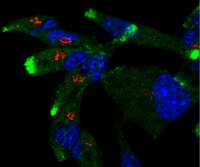ABN2268 Sigma-AldrichAnti-proSAAS
Anti-proSAAS Antibody, Cat. No. ABN2268, is a highly specific rabbit polyclonal antibody that targets ProSAAS and has been tested in Immunocytochemistry, Immunofluorescence, and Western Blotting.
More>> Anti-proSAAS Antibody, Cat. No. ABN2268, is a highly specific rabbit polyclonal antibody that targets ProSAAS and has been tested in Immunocytochemistry, Immunofluorescence, and Western Blotting. Less<<Recommended Products
Overview
| Replacement Information |
|---|
Key Spec Table
| Species Reactivity | Key Applications | Host | Format | Antibody Type |
|---|---|---|---|---|
| M, H, R | ICC, IF, WB | Rb | Serum | Polyclonal Antibody |
| References |
|---|
| Product Information | |
|---|---|
| Format | Serum |
| Presentation | Rabbit polyclonal antiserum with 0.1% sodium azide. |
| Quality Level | MQ100 |
| Physicochemical Information |
|---|
| Dimensions |
|---|
| Materials Information |
|---|
| Toxicological Information |
|---|
| Safety Information according to GHS |
|---|
| Safety Information |
|---|
| Packaging Information | |
|---|---|
| Material Size | 100 µL |
| Transport Information |
|---|
| Supplemental Information |
|---|
| Specifications |
|---|
| Global Trade Item Number | |
|---|---|
| Catalogue Number | GTIN |
| ABN2268 | 04054839362897 |
Documentation
Anti-proSAAS Certificates of Analysis
| Title | Lot Number |
|---|---|
| Anti-proSAAS - 3388995 | 3388995 |
| Anti-proSAAS - 4108304 | 4108304 |
| Anti-proSAAS Polyclonal Antibody | Q2933435 |








